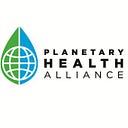Hugh Shirley Spotlights Moses Chimbari
By Hugh Shirley, Speaker Ambassador at the 2019 Planetary Health Annual Meeting
I had the honor of learning from Dr. Moses Chimbari during the 2019 Planetary Health Annual Meeting. Dr. Chimbari and I spoke at length about his past, the path he took throughout his career, and his current work. As a young student from Zimbabwe, Dr. Chimbari attended undergrad at Roma University in Lesotho. As a young undergrad, Dr. Chimbari studied Biology. His career began with a focus on forensic science for the Ministry of Home Affairs in Zimbabwe. His work didn’t involve public or planetary health, but over the course of his career, Dr. Chimbari became increasingly involved in the health of his community.
Dr. Chimbari pursued and obtained a PhD in snail ecology from the University of Copenhagen during the mid-90s, but this was after a decade of work in the field. After working as a forensic scientist, Dr. Chimbari transitioned into a medical research role. Eventually, Dr. Chimbari rose through the ranks to become the Dean of Research at the University of KwaZulu-Natal in South Africa, where he currently works. As the Dean of Research, Dr. Chimbari has educated and graduated many PhD and Master’s students. His experience as a mentor and educator has been profoundly beneficial for young researchers like me. On top of his work as a teacher, Dr. Chimbari has continued his own research projects with a focus on Bilharzia.
Bilharzia, or schistosomiasis, is a disease caused by flatworms and is prevalent in many countries in sub-Saharan Africa and other tropical regions around the world. The disease is spread commonly by river snails infected with the parasite. Dr. Chimbari has been working to stop the spread of bilharzia for decades and has used some of the leading techniques and strategies in planetary health to do it. Dr. Chimbari uses a method of community-based participatory research (CBPR) to actively engage with the people he works to help. Community members are trained to identify breeding grounds for river snails and report data back to Dr. Chimbari using mobile phone applications.
In addition to his research projects, Dr. Chimbari is heavily involved in TIBA, or Tackling Infections to Benefit Africa. TIBA is a consortium dedicated to fighting Africa’s biggest health challenges from the inside. Through collaboration, research, capacity strengthening, and education, TIBA unites universities for the mutual goal of reducing the burden of infectious diseases across the African continent. TIBA’s goal and methods reflect planetary health at large through the emphasis on community engagement and participation.
During the 2019 Planetary Health Annual Meeting, Dr. Chimbari participated in the breakout session “Communities, Justice, and Living Systems: Connections for a Healthy and Thriving Future” with four other speakers. During the panel discussion, which was moderated by Dr. Margot Parkes, Dr. Chimbari spoke about his work with TIBA and with the bilharzia monitoring and research program. He addressed the ecohealth approach that his research projects use, that is the inclusion of a sociological and environmental perspective in public health.
I learned about the series of EcoHealth conferences through my conversations with Dr. Chimbari. As a conference organizer myself, it was interesting to learn a bit about how he and his team are putting together the next summit, EcoHealth 2020. I hope that I have the chance to work with Dr. Chimbari in the future in some capacity. His history of mentorship at his home university, my experience with him at the Planetary Health Annual Meeting, and his research at his home institution in South Africa all reflect Dr. Chimbari’s dedication to the field of planetary health and his passion for leading the next generation of planetary health researchers in the right direction.
Disclaimer: The views and opinions expressed in this article are those of the author and do not necessarily reflect the position of the Planetary Health Alliance or its members.
